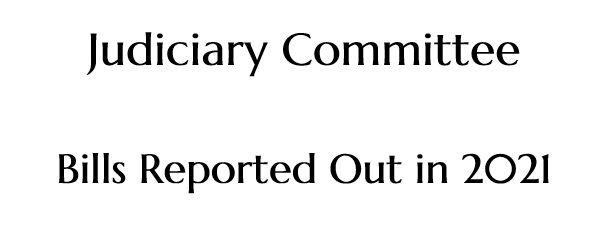Judiciary Committee News

Criminal justice reform, protecting the vulnerable, and improving court operations are ongoing concerns of the Judiciary Committee, of which I am a member. As I did last week with significant bills that have moved out of the Environment Committee, I want to give you an update on a few key bills I voted in favor of and which have passed out of the Judiciary Committee. They now will be considered by the Speaker of the House to be called for a full vote by the General Assembly.
Please remember this is just a sampling of the more significant bills; to read a full list of all the bills on which the committee has voted, click HERE.
HB 6594, AN ACT CONCERNING THE CRIMINAL JUSTICE PROCESS.
This is an omnibus bill worked out cooperatively by the Sentencing Commission, the Public Defenders Office and the Chief State's Attorney's Office. Among other things, it would increase penalties for cyberstalking and reduce the size of "drug-free" zones from 1,500 feet to 200 feet. This was done in recognition that people in densely populated areas are often within a school zone and suffer disproportionate penalties as compared with those who sell drugs in rural areas.
This bill would update the State's compassionate parole statute concerning medical release of prisoners in light of the problems the pandemic presented.
SB 1019, AN ACT CONCERNING THE BOARD OF PARDONS AND PAROLES, ERASURE OF CRIMINAL RECORDS FOR CERTAIN MISDEMEANOR AND FELONY OFFENSES, PROHIBITING DISCRIMINATION BASED ON ERASED CRIMINAL HISTORY RECORD INFORMATION AND CONCERNING THE RECOMMENDATIONS OF THE CONNECTICUT SENTENCING COMMISSION WITH RESPECT TO MISDEMEANOR SENTENCES.
Known as the "Clean Slate" bill, this legislation would erase misdemeanor and certain felony convictions provided the person has not reoffended. It also reduced from 365 days (one year) to 364 days the penalty for certain low-level misdemeanors to protect non-violent undocumented people from automatically being put at risk for deportation.
In recognition that underage drinking is an unfortunate reality, this bill would provide immunity from prosecution for alcohol possession for underage people who seek emergency help to prevent a friend's death. In other words, it will encourage young people to act responsibly in a dangerous situation (possibly even one of their own making).
SB 972, AN ACT CONCERNING THE COST OF TELECOMMUNICATIONS SERVICES IN CORRECTIONAL FACILITIES.
Recognizing that incarcerated people who do not stay in touch with family and friends are at far greater risk to recidivate and are less likely to re-enter society successfully, this legislation proposes to make phone calls from prison free of charge. Currently, the State contracts with a company that charges exorbitant rates for phone calls, which often prevents this critical lifeline.
HB 5598, AN ACT CONCERNING A PROPERTY OWNER'S LIABILITY FOR THE EXPENSES OF REMOVING A FALLEN TREE OR LIMB.
Most of us have experienced the confusion (and sometimes the conflict) when a tree limb on a neighbor's property falls on our property. This bill would clarify that it is the responsibility of the property owner on which the tree grows to maintain and remove dangerous limbs.
HB 6455, AN ACT CONCERNING IMPEDING OR OBSTRUCTING THE GENERAL ASSEMBLY AND INTERFERENCE WITH OR ASSAULT UPON A STATE CAPITOL POLICE OFFICER.
Following the atrocious events of Jan. 6, this bill is crafted to protect our State Capitol Police and to ensure that demonstrations remain peaceful.
HB 6657, AN ACT CONCERNING HUMAN TRAFFICKING.
This bill would provide a protection known as "vacature" for victims of human trafficking. Recognizing that traffickers often coerce their victims into committing crimes, the vacature provision would potentially vacate any crimes committed by victims of human trafficking, regardless of how old they were. A judge would determine whether the conviction shall be vacated, meaning in cases of violent crime, a judge's discretion would still prevail.





